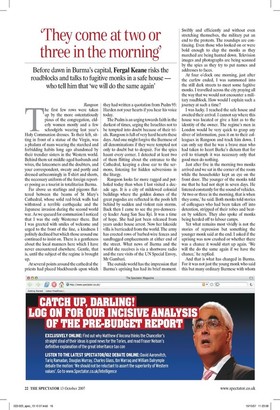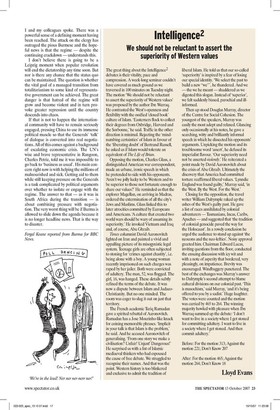'They come at two or three in the morning'
Before dawn in Burma's capital, Fergal Keane risks the roadblocks and talks to fugitive monks in a safe house — who tell him that 'we will do the same again' Rangoon The first few rows were taken up by the more ostentatiously pious of the congregation, elderly women mostly and a few schoolgirls wearing last year's Holy Communion dresses. To their left, sitting in front of a statue of the Virgin, was a phalanx of nuns wearing the starched and forbidding habits long ago abandoned by their trendier sisters in the Western world. Behind them sat middle-aged husbands and wives, the latecomers and the doubters, and your correspondent, sweaty and portly and dressed unbecomingly in T-shirt and shorts, the necessary uniform of the foreign reporter posing as a tourist in totalitarian Burma.
Far above us starlings and pigeons fluttered between the beams of St Mary's Cathedral, whose solid red-brick walls had withstood a terrible earthquake and the Japanese invasion during the second world war. As we queued for communion I noticed that I was the only Westerner there. But I was greeted with smiles of welcome and urged to the front of the line, a kindness I politely declined but which those around me continued to insist on. There is a gentleness about the local manners here which I have never encountered elsewhere. Gentle, that is, until the subject of the regime is brought up.
At several points around the cathedral the priests had placed blackboards upon which they had written a quotation from Psalm 95: Harden not your hearts if you hear his voice today.
The Psalm is an urging towards faith in the darkest of times, urging the Israelites not to be tempted into doubt because of their trials. Rangoon is full of very hard hearts these days. And one might forgive the Burmese of all denominations if they were tempted not only to doubt but to despair. For the spies haunt every corner. I detected at least two of them flitting about the entrance to the Cathedral, keeping a close ear to the sermons, listening for hidden subversions in the liturgy.
Rangoon looks far more ragged and potholed today than when I last visited a decade ago. It is a city of mildewed colonial buildings where the golden domes of the great pagodas are reflected in the pools left behind by sudden and violent rain storms. Back then I came to see the pro-democracy leader Aung San Suu Kyi. It was a time of hope. She had just been released from years under house arrest. Now her lakeside villa is barricaded from the world. The army has erected rows of barbed-wire fences and sandbagged emplacements at either end of the street. What news of Burma and the world she receives is via a shortwave radio and the rare visits of the UN Special Envoy, Mr Gambari.
The outside world has the impression that Burma's uprising has had its brief moment.
Swiftly and efficiently and without even stretching themselves, the military put an end to the protests. The roundups are continuing. Even those who looked on or were bold enough to clap the monks as they marched are being hunted down. Television images and photographs are being scanned by the spies as they try to put names and addresses to faces.
At four o'clock one morning, just after the curfew ended, I was summoned into the still dark streets to meet some fugitive monks. I travelled across the city praying all the way that we would not encounter a military roadblock. How would I explain such a journey at such a time?
I was lucky. I reached the safe house and awaited their arrival. I cannot say where this house was located or give a hint as to the identity of the owner. The regime's men in London would be very quick to grasp any sliver of information, pass it on to their colleagues in Rangoon and track him down. I can only say that he was a brave man who had taken to heart Burke's dictum that for evil to triumph it was necessary only that good men do nothing.
Just after five in the morning two monks arrived and we sat in the corner of the room while the householder kept an eye on the front door. The younger of the monks told me that he had not slept in seven days. He listened constantly for the sound of vehicles. 'At two or three in the morning, that is when they come,' he said. Both monks told stories of colleagues who had been taken off into detention, stripped of their robes and beaten by soldiers. They also spoke of monks being herded off to labour camps.
Yet what remains most vividly is not the stories of repression but something the younger monk said at the end. I asked if the uprising was now crushed or whether there was a chance it would start up again. 'We will the do the same again if we have the chance,' he replied.
And that is what has changed in Burma. For it was not just the young monk who said this but many ordinary Burmese with whom I and my colleagues spoke. There was a powerful sense of a defining moment having been reached. The attack on the clergy has outraged the pious Burmese and the hopeful news is that the regime — despite the continuing crackdown — understands this.
I don't believe there is going to be a Leipzig moment when popular revolution will end the dictatorship any time soon. But nor is there any chance that the status quo can be maintained. The question is whether the vital goal of a managed transition from totalitarianism to some kind of representative government can be achieved. The great danger is that hatred of the regime will grow and become violent and in turn provoke greater repression until the country descends into chaos.
If that is not to happen the international community will have to remain seriously engaged, pressing China to use its immense political muscle so that the Generals' talk' of dialogue is converted into real negotiations. All of this comes against a background of escalating economic crisis. The UN's wise and brave representative in Rangoon, Charles Petrie, told me it was impossible to go back to 'business as usual'. His main concern right now is with helping the millions of malnourished and sick. Getting aid to them while still keeping pressure on the Generals is a task complicated by political arguments over whether to isolate or engage with the regime. The answer to that — as it was in South Africa during the transition — is about combining pressure with negotiation. The very worst thing will be if Burma is allowed to slide down the agenda because it is no longer headline news. That is the way to disaster.
Fergal Keane reported from Burma for BBC News.




































































 Previous page
Previous page